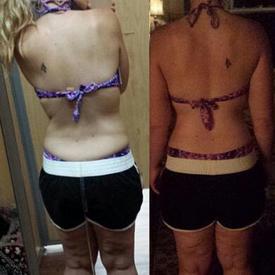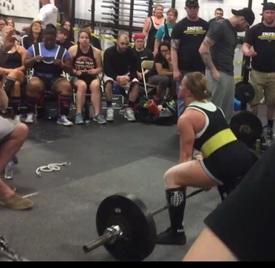What qualifies as "heavy lifting"?

almarsala
Posts: 168 Member
Everyone keeps talking about heavy lifting but no one really explains what that means. I'm doing 100 squats with 30 pounds and 100 lunges with 8 pound hand weights, etc. The lunges are actually more intense for me with less weight. Any insight?
0
Replies
-
Typically it is a weight that limits you to a 6 to 8 rep range for a working set. Depending on your program, working sets can range from 1 to 5 working sets.
New Rules of Lifting for Women, Stronglifts, and Starting Strength are worth checking out to learn more.0 -
Heavy lifting usually means the maximum weight you can do in the 10-12 rep range for 4-5 sets using compound lifts. 6-8 reps is more for power and lower than that is a power lifting routine. Volume training emphasizes heavy lifting doing up to 10 sets per body part. If you do this then you need to pick 2-3 lifts you like for a body part and use those. The first lift for each body part should always be a compound lift. Its also typically done for one body part per week to allow the muscle to fully recover.0
-
what is a compound lift?0
-
Compound exercises in weight training are those that involve more than one joint and muscle group. Examples are squats, deadlifts and chin-ups. For example, the squat involves the joints of the knee, hip and ankle, and the muscles of the upper and lower legs and buttocks.0
-
Everyone keeps talking about heavy lifting but no one really explains what that means. I'm doing 100 squats with 30 pounds and 100 lunges with 8 pound hand weights, etc. The lunges are actually more intense for me with less weight. Any insight?
If you can do more than 12-15 reps, you're not using enough weight.0 -
bump0
-
I think first you should ask, if you have not, what goal to you hope to achieve with strength training?
If it is weight loss, then more reps and light weight is best because it keeps you aerobic. This option will shred fat faster and build lean muscle, but will typically not bulk you.
If it is muscle or strength gain, than you want to do fewer reps with much higher weight.
Either way, search for strength training workout plans which will guide you based on percentages of you max for each exercise. Depending on which source or trainer you seek out, you will be guided to consider drop sets, pyramids, etc.
No matter what you decide, the key to gaining either aerobic capacity or strength is muscle confusion so do not simply go to the gym and do the same exercise time after time. Generally a mix of the two above is best.0 -
Started lifting heavy about a month or so back after reading so many threads on the importance of it. It's made all the difference in the world in all my other workouts, be it cardio, Pilates, Yoga, it doesn't matter which, my body is so much more conditioned in even this short of time. I feel stronger, far more confident in what I can do and LOVE LOVE LOVE the feeling of lifting heavy. It's challenging while doing it but what a great feeling of accomplishment each time I finish up the last rep and finish up lifting for the day.
Thanks to all of you on here that have learned the importance of it & then taken time to share how important lifting heavy can be for all of us, not only men but women as well of course.
You are appreciated!!
It's changed my life and how I look at fitness and my future goals. :drinker:
Hearts 0
0 -
bump0
-
For myself it's 3-5 sets depending on the workout and time with a range of 5-8 reps where the last 2 reps I feel like throwing in the towl.
 For heavy legs it's where I know I need a spotter to help me with the last one. I don't like to go above 10-12 reps bc it becomes too easy and pointless for muscle building for me. 0
For heavy legs it's where I know I need a spotter to help me with the last one. I don't like to go above 10-12 reps bc it becomes too easy and pointless for muscle building for me. 0 -
Well it isn't heavy if your able to do 100 for sure!

It depends on the person which is why it isn't defined. Lift as heavy as you possibly can for 8-12 reps. If you make it to 12 and can keep going, then bump up the weight.0 -
My lifts are really light but to me they are heavy because I'm really puney. Lol. It just depends on your level of strength. if you can do more than 12-15 reps it's not heavy enough. With the routine that I'm doing, I never go over 12 reps. When I can get 2 sets of 12 reps, I go back down to 8 reps with a heavier weight.0
-
If it is weight loss, then more reps and light weight is best because it keeps you aerobic. This option will shred fat faster and build lean muscle, but will typically not bulk you.
/quote]
This is not accurate. Weight training regardless of reps will increase metabolism for up to 35 hours post workout. The higher reps also put you at greater risk for an over use injury. If you are going to try and go aerobic do cardio. Otherwise use weight training for strength and muscle growth. Higher reps also will not engage fast twitch muscles. All of the scientific studies point to less than 15 reps on almost all exercises regardless of goals.0 -
If it is weight loss, then more reps and light weight is best because it keeps you aerobic. This option will shred fat faster and build lean muscle, but will typically not bulk you.
/quote]
This is not accurate. Weight training regardless of reps will increase metabolism for up to 35 hours post workout. The higher reps also put you at greater risk for an over use injury. If you are going to try and go aerobic do cardio. Otherwise use weight training for strength and muscle growth. Higher reps also will not engage fast twitch muscles. All of the scientific studies point to less than 15 reps on almost all exercises regardless of goals.
That may be true, and I am basing my opinion or apparently older (mis) conceptions; however, overuse injuries can and do frequently occur as a result of heavy weight. The problem with heavy weight is that it magnifies poor technique and causes us to compensate in ways which the body is not designed to do.
I was not advocating dozens or hundreds or reps, only stating that traditionally 16 - 20 reps and a lighter weight has been thought to be better for fat loss. Higher reps with lower weight raises the HR into the aerobic zone. It appears that studies are conflicting and have been for years. Exercise and dieting go back and forth all the time between high this and low that. I am not dismissing studies as I have a medical and scientific background, and perhaps I should have clarified that I was thinking along the lines of circuit training.
Anyway, I did not know about the post workout benefit so this is good knowledge.0 -
Thank you all so much for your responses, all the new info is SO helpful!
Does anyone have any insight on whether I should be working whole body every workout or is focusing on specific parts of my body more beneficial?0 -
That's what I came here to say. Amusing and accurate.Well it isn't heavy if your able to do 100 for sure!
Most people I know do specific parts for each day. The main benefit that gives you is the ability to rest that body part and do another the next day. For instance if you did legs on Monday (Squats, lunges, deadlifts) you could come right back in on Tuesday and do chest and back and hit biceps and triceps on Wednesday. I also like really focusing in on certain parts each day and it mixes things up so you're not doing the same thing every time you go to the gym.should be working whole body every workout or is focusing on specific parts of my body more beneficial?0 -
Thank you all so much for your responses, all the new info is SO helpful!
Does anyone have any insight on whether I should be working whole body every workout or is focusing on specific parts of my body more beneficial?
I've done it both ways and I prefer whole body every other day with cardio on non-lift days.
But you may want to try a month or two each way and figure out what you prefer.0 -
Thank you all so much for your responses, all the new info is SO helpful!
Does anyone have any insight on whether I should be working whole body every workout or is focusing on specific parts of my body more beneficial?
You might want to share your goals for exercise to help folks better help you...
If your goal for specific body parts is losing weight in that area, please know you cannot SPOT reduce.
I am working on losing weight and better fitness and strength. My preference is for less moves that workout a maximum of muscles at once - like the New Rules of Lifting or 5x5... I get in and out of the gym much quicker that way!0 -
my goal is to keep losing fat and gain strength/muscle. I have about another 50-60 pounds I'd like to lose. I've lost 100 so far so everything is in desperate need of tightening/lifting0
-
bump0
-
I think of lifting heavy as lifting enough weight (or doing BW exercises of sufficient difficulty) that you reach failure in 1-8 reps. That is the benefits of your lifting will be heavily slanted to strength gains more than anything else. Lifting heavy is done to get stronger. Lifting a weight so light that you can do 10+ reps is a pitifully inefficient way to get stronger.
The fastest gains come when you working at a weight you'd reach failure in 3-5 reps if using a normal set protocol. Increase your rest times and increase the total number of sets (as in live in the gym or have a home gym suitable) and you'll gain strength even faster if you are working even heavier, where you'll fail after 1-2 reps.
10+ reps does virtually nothing for your strength if your not a noob. What it does is increase your capacity to do reps and sets, it increases your capacity to do work (which makes muscles grow bigger too, but they don't get much stronger). While this is a useful trait for muscles to have (bodybuilders tend to focus here because this is where most size gains occur), this is surely not what is implied when people refer to lifting heavy. Lifting heavy is lifting with the goal to get stronger.0
This discussion has been closed.
Categories
- All Categories
- 1.4M Health, Wellness and Goals
- 398.2K Introduce Yourself
- 44.7K Getting Started
- 261K Health and Weight Loss
- 176.4K Food and Nutrition
- 47.7K Recipes
- 233K Fitness and Exercise
- 462 Sleep, Mindfulness and Overall Wellness
- 6.5K Goal: Maintaining Weight
- 8.7K Goal: Gaining Weight and Body Building
- 153.5K Motivation and Support
- 8.4K Challenges
- 1.4K Debate Club
- 96.5K Chit-Chat
- 2.6K Fun and Games
- 4.8K MyFitnessPal Information
- 13 News and Announcements
- 21 MyFitnessPal Academy
- 1.6K Feature Suggestions and Ideas
- 3.2K MyFitnessPal Tech Support Questions















